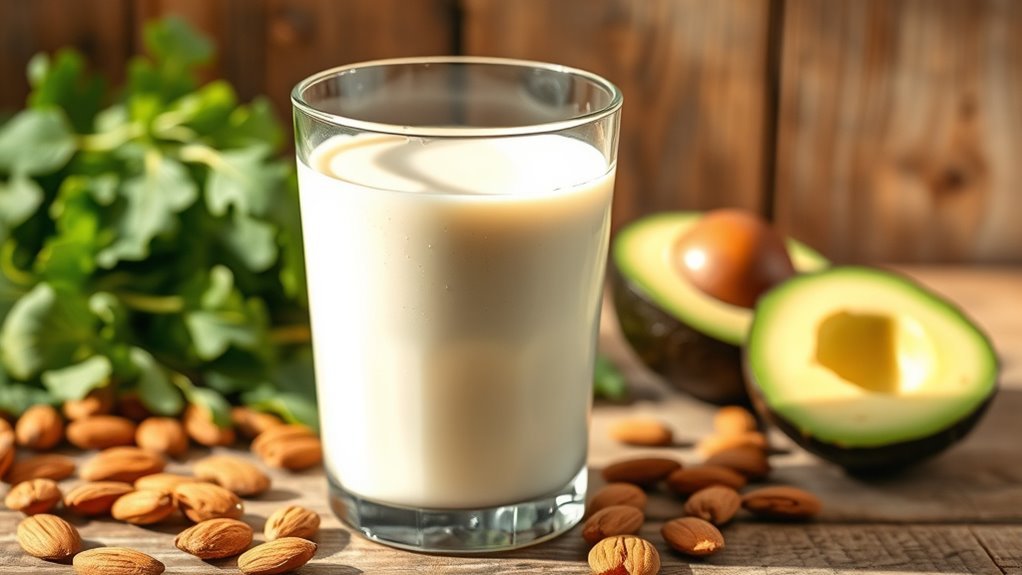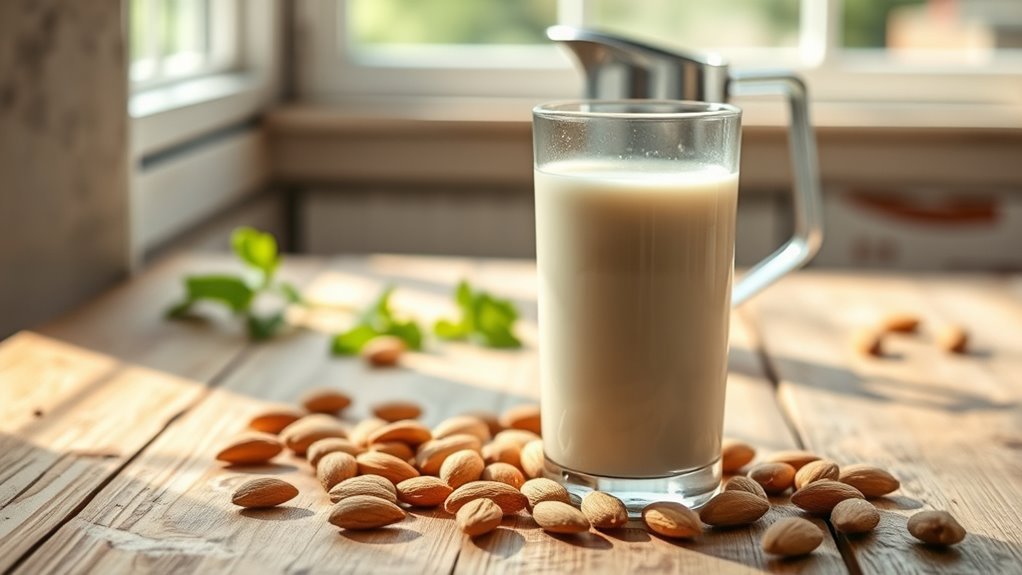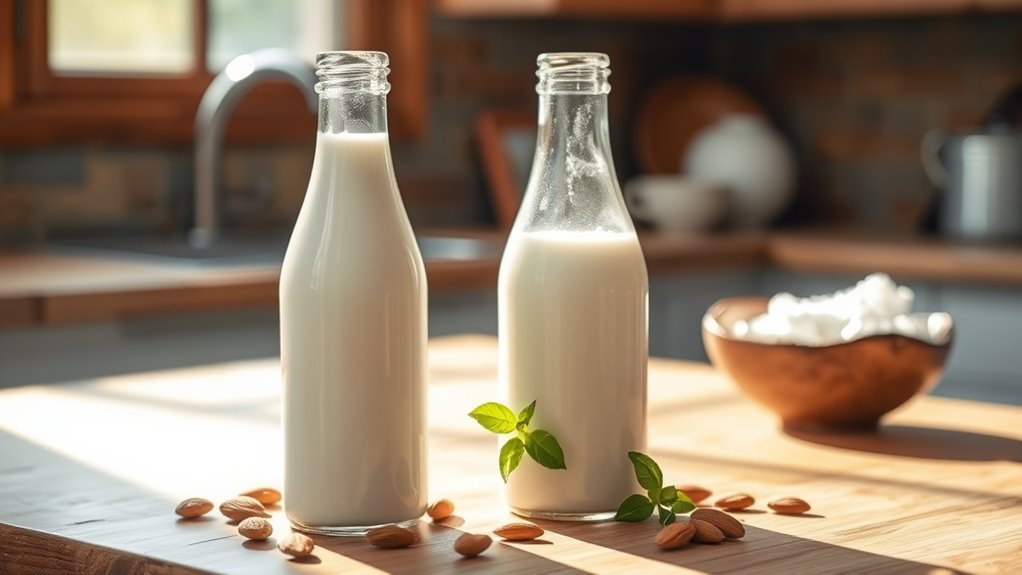If you’re on a ketogenic diet, you’ll want to choose low-carb milk alternatives. Unsweetened almond milk and coconut milk are excellent options, with only 1-2 and 2-6 grams of carbs per cup, respectively. Heavy cream is another great choice as it’s low in carbs and high in fat. Avoid sweetened varieties to prevent excess sugar. By selecting the right options, you can keep your carb intake in check while enjoying your favorite beverages. Explore more about integrating these alternatives into your meals!
Understanding the Ketogenic Diet and Its Carb Limits

When you’re considering the ketogenic diet, it’s important to understand its core principle: limiting carbohydrate intake to achieve a state of ketosis. This metabolic state allows your body to burn fat for fuel instead of carbs. To succeed, you’ll need to embrace the ketogenic principles, which focus on high fat, moderate protein, and very low carbs—typically around 20 to 50 grams per day. Carb counting becomes an important tool in your journey, helping you track your intake and stay within those limits. Remember, not all carbs are created equal; prioritize nutrient-dense, low-carb foods. By mastering these concepts, you can enjoy the freedom to explore a variety of meal options while effectively reaching your health goals on a ketogenic diet.
The Best Keto-Friendly Milk Options

Choosing the right milk on a ketogenic diet can feel overwhelming, especially with so many options available. To maintain your low carb lifestyle, it’s crucial to focus on milk with a favorable nutritional content. Unsweetened almond milk is a popular choice, offering only about 1-2 grams of carbs per cup. Coconut milk is another excellent option, with around 2-6 grams of carbs, depending on the brand. If you prefer a dairy option, heavy cream is low in carbs and high in fat, making it perfect for keto. Additionally, you might consider using unsweetened soy milk, which has about 3-4 grams of carbs per cup. Always check labels to confirm you’re choosing the best low carb options for your diet.
Milk Alternatives: Which Ones Fit the Keto Profile?

While you might think of milk as a staple, many alternatives can fit seamlessly into a ketogenic diet. Nut milk options, like almond and macadamia milk, are low in carbs and often fortified with vitamins, making them excellent dairy alternatives. Coconut milk is another popular choice, offering healthy fats while keeping your carb intake in check. However, be cautious with sweetened varieties, as they can sneak in unwanted sugars. Unsweetened soy milk can also be a viable option, but watch for added ingredients. Ultimately, focusing on unsweetened versions of these alternatives keeps your diet on track. By choosing wisely, you can enjoy the freedom of diverse flavors without compromising your keto goals.
How to Incorporate Keto Milk Into Your Diet
Incorporating keto milk into your diet can be a simple yet effective way to enhance your meals and snacks while keeping your carb intake low. Start by using keto milk substitutes in your morning coffee or tea for a creamy texture without the carbs. You can also whip up easy keto milk recipes, like a low-carb smoothie or a rich chia pudding, to satisfy your cravings. If you enjoy baking, consider substituting traditional milk with unsweetened almond or coconut milk in your favorite recipes. Additionally, try using keto milk in sauces or soups to add richness without compromising your dietary goals. By creatively integrating these alternatives, you’ll enjoy diverse flavors while staying committed to your keto lifestyle.
Potential Pitfalls: What to Avoid With Milk on Keto
When integrating keto milk into your meals, it’s important to be mindful of certain pitfalls that can derail your low-carb efforts. First, if you’re lactose intolerant, traditional dairy milk might pose digestive issues for you. Opt for lactose-free or plant-based alternatives instead. Additionally, be cautious of hidden sugars in flavored or sweetened milk options, which can sneak in extra carbs and disrupt your ketosis. Always check labels for added ingredients that can undermine your dietary goals. Finally, remember that even keto-friendly milks should be consumed in moderation, as they can still contribute to your total carb intake. Staying informed and vigilant will help you enjoy milk without sacrificing your commitment to a keto lifestyle.
Frequently Asked Questions
Can I Drink Milk on a Ketogenic Diet?
Yes, you can drink milk on a ketogenic diet, but it’s crucial to take into account its carb content. Regular cow’s milk contains more carbs than many keto-friendly alternatives. If you’re looking for options, unsweetened almond milk or coconut milk can be great choices, offering lower carbs. Always check labels to make sure you’re staying within your carb limits, and remember that moderation is key to maintaining your desired state of ketosis while enjoying your favorite beverages.
Is Almond Milk Lower in Carbs Than Regular Milk?
Yes, almond milk is generally lower in carbs than regular milk. When you look at almond milk nutrition, you’ll find it typically contains about 1-2 grams of carbs per cup, compared to around 12 grams in a cup of cow’s milk. This carb comparison makes almond milk a popular choice for those wanting to reduce their carb intake. Just make sure to choose unsweetened varieties to keep those carbs even lower!
Does Lactose-Free Milk Fit Into Keto Guidelines?
Lactose-free milk can fit into keto guidelines, but it depends on the brand and its carb content. While it’s a great option for those who are lactose intolerant, many lactose-free varieties still contain similar carbs as regular milk, which can impact your daily carb limit. If you’re looking for low-carb, lactose-free options, consider alternatives like unsweetened almond or coconut milk, which generally have fewer carbs and can help you maintain your keto lifestyle.
How Does Milk Affect Ketosis Levels?
Milk can impact your ketosis levels due to its composition. While you might think all milk is off-limits, certain options, like unsweetened almond or coconut milk, can keep you in ketosis. Regular milk contains lactose, a sugar that could raise insulin levels and disrupt ketosis. To maintain your freedom on keto, focus on low-carb milk alternatives, ensuring you stay within your daily carb limits while enjoying your favorite beverages.
Are There Any Hidden Sugars in Keto Milk Alternatives?
Yes, there can be hidden sugars in milk alternatives, so it’s essential to read labels carefully. Many brands add sweeteners to enhance flavor, which can sneak in carbohydrates. Almond milk, for instance, often has low sugar, but flavored varieties might contain added sugars. Coconut milk is generally low in sugar, while soy milk varies. To stay within keto guidelines, opt for unsweetened versions and always check the ingredient list for any hidden sugars.
1. What types of milk are considered keto-friendly?
Keto-friendly milk options typically include unsweetened almond milk, unsweetened coconut milk, and heavy cream. These alternatives are low in carbohydrates, making them suitable for a ketogenic diet. For example, unsweetened almond milk has about 1 gram of carbs per cup, while heavy cream has minimal carbs and is high in fats, aligning perfectly with keto guidelines.
2. Is whole milk keto-friendly?
Whole milk is not typically considered keto-friendly due to its higher carbohydrate content. A cup of whole milk contains about 12 grams of carbs, which can take up a significant portion of your daily carb allowance on a ketogenic diet. If you choose to consume whole milk, it’s advisable to do so in moderation and account for the carbs in your overall daily intake.
3. Can I use flavored nut milks on a keto diet?
Flavored nut milks, such as vanilla or chocolate almond milk, often contain added sugars, which can significantly increase their carbohydrate content. It’s best to avoid these flavored options unless they are specifically labeled as unsweetened and keto-friendly. Always check the nutrition label for added sugars to ensure they fit within your keto macros.
4. Is oat milk a good choice for a keto diet?
Oat milk is generally not considered a good choice for a keto diet due to its high carbohydrate content. A cup of oat milk can contain around 15-20 grams of carbs, which is excessive for those aiming to maintain ketosis. If you’re looking for a milk alternative, opt for those lower in carbs, such as almond or coconut milk.
5. How can I incorporate keto-friendly milk into my diet?
You can incorporate keto-friendly milk into your diet in various ways. Use unsweetened almond or coconut milk in smoothies, coffee, or as a base for keto-friendly sauces and soups. Heavy cream can be added to coffee or tea for a rich, creamy texture, or used in cooking to create low-carb dishes. Always ensure that your choice aligns with your daily carb limit for optimal results on your keto journey.
References
- https://www.healthline.com/nutrition/keto-diet-milk-options
- https://www.medicalnewstoday.com/articles/323448
- https://www.nutrition.gov/topics/whats-in-food/milk
- https://www.ncbi.nlm.nih.gov/pmc/articles/PMC6520826/
- https://www.wisewell.com/blogs/blog/keto-diet-milk-guide
- https://www.clevelandclinic.org/health/diseases/12066-keto-diet-faqs
- https://www.webmd.com/diet/what-is-the-keto-diet
- https://www.verywellfit.com/keto-diet-5115537


